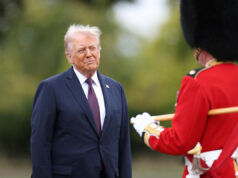A new investigation by Cyabra has linked thousands of social media posts on Scottish independence and Brexit to an Iranian state-backed influence campaign.
According to the report, “26% of profiles discussing Scottish independence were fake, posting more than 3,000 posts in just six weeks.” These accounts, the researchers said, blended into online debates by pushing pro-independence and anti-Brexit messages, while targeting institutions like the BBC and Labour Party with accusations of bias.
Download and read Cyabra’s full report.
The report described the operation as “a disinformation campaign hidden in plain sight”. Cyabra found the network relied on AI-generated profile images, Scottish slang, and emotionally loaded slogans such as “Another very good reason for #ScottishIndependence” and “Brexit betrayal”. Hashtags including #ScottishIndependenceASAP, #BBCLies, and #LabourLies were pushed repeatedly across multiple accounts, which also engaged with each other to create the appearance of consensus.
Cyabra calculated that the coordinated effort “generated over 224 million potential views and more than 126,000 user engagements.”
The bot network’s cover was blown in June by our reporting when, after a strike on Iran’s power grid, hundreds of fake accounts abruptly went silent. “All at once, the fake profiles stopped posting. For more than two weeks, they vanished – no posts, no noise, just digital silence,” the report noted. When they returned 16 days later, their focus had shifted to defending Iran and mocking the West.
This pivot reinforced suspicions of state control. As the report put it: “This coordinated blackout – followed by a synchronized return and sudden messaging shift – left little room for doubt. It was clear: this was a state-controlled operation caught mid-glitch.”
The second phase of the campaign emphasised Iran’s resistance to U.S. and European pressure, contrasting what it portrayed as Iran’s “moral clarity” with Western “hypocrisy.” Fake accounts even drew parallels between Scotland’s independence movement and Iran’s confrontation with the West.
Cyabra argued that the wider intent was clear: “They seed division, amplify existing tensions, and hijack political discourse – and they do all of this while maintaining a credible, authentic-looking image.”
The group concluded that while the immediate goal was to legitimise Iran’s foreign policy stance, “the major goal in those long-game influence operations is always the same – to divide Western societies, discredit democratic institutions, and manipulate public perception by creating a distorted reality.”
Editor’s Note – This article does not claim that Scottish independence is a foreign plot, nor does it suggest that support for independence is illegitimate, inauthentic, or driven by anything other than sincere political conviction. The focus is not on genuine activists or grassroots communities, but on documented attempts by Iranian-linked actors to exploit real political movements in the UK for strategic advantage.
Importantly, the article does not equate support for independence with foreign manipulation. Rather, it highlights how state actors — in this case, Iran — often mimic the language and cultural markers of existing political groups in order to infiltrate and distort online debate. This includes crafting fake personas aligned with left-wing or anti-imperialist sentiment, not to persuade, but to amplify and launder their own narratives through credible channels. All claims made are supported. Readers are encouraged to engage with the primary sources linked throughout the article.














Won’t get many directly acknowledging the Brexit element I suspect. Has been reported before. We should all be cognisant that this is rife and this is just one Iranian bot farm, I’m sure there are others let alone from other countries too.
Tucking into a genuine sentiment and weaponising it to your means isn’t even a new principle, the capability is really in being able to sway minds enmasse – the point isn’t about anyone’s position being vindicated by this 3rd party, they don’t care 😂😂 they want any situation that benefits them.
It could be the right, it could be the left… although the right’s viewpoint seems to be disproportionately susceptible to being co-opted
It’s interesting though, a form of weaponised psychological intervention to large groups. Again not new, but the method gives the user more control and the ability to change the message quickly.
Russia is a master at it…. Just look at all the interference in the elections of countries in the Russian sphere of influence…
They even have a puppet in the White House.
Yep important to remember that they don’t actually care about the issues they use. They’re almost certainly making pro-brexit posts then switching accounts to make anti-brexit posts for example.
The goal is not to shift public opinion but to make it impossible to form a consensus with an overwhelming amount of contrary opinions.
There are exceptions as when, for example a people is maturing into a new nation or recovering its sense identity, but as a rule of thumb influences towards separation are usually trying to disintegrate; they are destructive. It’s always smart to ask the question ‘who really benefits’? Why do Putin and his friends attack the UK, try to break it down and separate it from Europe? Maybe because they know we are the lynchpin of the West and NATO.
Some one on here does have great interest in Scottish independence. why?
Scotland has many mentions, loads and loads in fact but It’s because George Is Scottish and the “Head office” is also in Scotland, I found that out a few months back when another poster dared to question the Scottish Bias.😁
Personally, I take the mick a bit but I can understand why.
“you can take my freedom but please don’t ban me”
#JJ day 3.
Does seem some one is a bit obsessed at times with independence when it does not relate to defence stories or has a very weak link to any. I live in the North of Scotland but have no interest in politics just the defence stories which i find are mostly very good on here. And I enjoy the comments as some on here are clearly experts in some fields and their insight is good to have.
It would be naive to think that isn’t foreign agents in the comments of UKDJ. At the very least they’ll be saying how useless and ineffective the UK armed forces are to try and spread negativity. It helps suppress defense budgets and ensure a turn over of political parties and strategies.
Very true, Well the Armed forces are not at their best we all know that but light is at the end of the tunnel, just. Seems Russia/China, Iran do what they want interfering and we do nothing about it. That in its self is seen as weakness. How ever not all comments on here are from real people that has easily been proven.
Easily proven ? Any links ?
I regularly question my sense of reality…the jury is still out.
Yeah, don’t forget to check under your bed tonight !!!
You think there are “forein agents” here ? just because someone says things that are true about the UK armed forces.
Do you have names ?
Bob down the road is a quisling I’m sure..he said only have 2 F35b squadrons was a joke when a few lads were chatting down the pub, I recon we should dob him in and get him carted off to Guantanamo bay and give Him a nice orange jump suite.
In reality they would be creating disruptive posts that create divisions..political warfare against a nation is not generally to guide a nation in one way, it’s to disrupt the a ability of a nation to make coherent and cohesive decisions.
Most commentators on here will very happy critique defence policy and procurement, that is a healthy part of democracy, political warfare does not want than, it wants complete disharmony.
As an example I agree with most posters on here in that we all agree we need stronger armed forces as a deterrent to war, I will disagree and debate the details.
I’m still waiting to see names or examples.
Then we can see what George and Lisa think about having “Foreign Agents” commenting on their site.
“George has a degree in Cyber Security and Lisa controls the Comments and Internet content” or something like that.
Maybe DM is really Ulya, maybe I’m Jim, maybe JJ is Spyinthesky I already know that Dern is Del boy and TorpedoJ is actually Spiderman.
Jonathan, is it true you are The Milky Bar Kid ?
How did you know, are you Professor Charles Xavier… you are aren’t you…admit it.
Was it johninMK (something in MK if not John) we had not long ago? He was blatantly dancing to someone’s tune, the same user name was even seen on a russian speaking forum. It was an open joke every time he commented, someone would ask him what the weather is like in Moscow., he was that obvious.
Before my time but again I ask If “he” was actually proven to be a “Foreign Agent” or just someone deliberately winding others up ?
There is a massive difference between the two.
Halfwit,
I do not think DM would like to be girl ork 😀
Ah but maybe you aren’t either ?
See that’s the thing about sites like this, anyone can be anyone.
Maybe I’m actualy not a Halfwit ?
Anyway, nice for you to turn up, I was trying to get to chat with you a week or so ago, hope you can stick around.
Halfwit,
You decide what i am, I like ork though, it has became a good word. I will be around for some days. I will answer your questions as well as I can
It’s fine, you’ve answered any questions I had. 👍
Other than in Scotland itself I for one have not seen much of anything, with regard to Scottish independence in any of the national papers. That aside, modern technology as it is, facilitates all manner of comments and debate from anyone any anybody.
Therefore lots of sites and forums for anyone at all to post, agitate, and influence for good the bad and pretty ugly stuff too.
Taking every comment with a pinch of salt is best. Trolls abound everywhere not just here. The posts worth reading are the analytical about defence matters. TWZ has great articles, but comments can be very anti Trump. It gets boring. Personally I get fed up with The Scots stuff on here, ok the guy is a Scot but to constantly blow on about Scots yards becomes repetitive.
As for Iran? Same goes for lots of other countries interference, its just a bore.
I really really wonder that NATO does not fight this warfare. We have it in Germany, too – so many bot farms supporting far right AFD and Putins Puppets of BSW, especially on Facebook. Just mud, disinformation and hate.
I wouldn’t be surprised at all if this is going on in The Netherlands as well. There are loads of Facebook accounts relentlessly banging on about divisive talking points (more often than not fact free and totally unrelated to the to the topic discussed) that make one wonder whether these people even have time for a job. Or is this their job? I agree with you NATO should pay attention to this, but if they are already doing that, I think they are unlikely to advertise it.